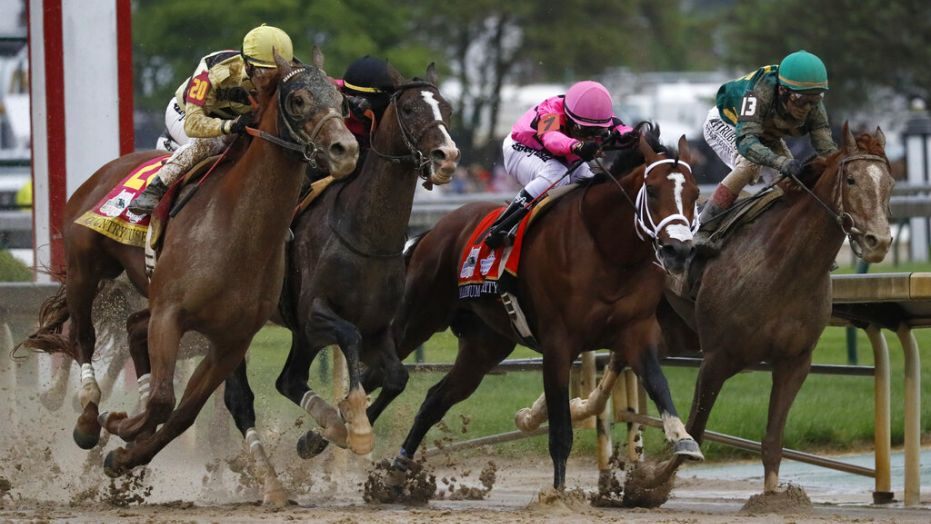A Look Inside the Kentucky Derby Lawsuit
It’s time to look inside another strange sports-betting tale coming out of the United States, that being the lawsuit filed by the billionaire owners of Maximum Security, the horse that crossed the finish line first in the US’s most prominent horse race, the Kentucky Derby, but was disqualified for interference after a lengthy review of race footage by Churchill Downs stewards. Gary and Mary West filed their action recently in the US District Court for the Eastern District of Kentucky, which includes the city of Louisville, where the Kentucky Derby is held.
For those unfamiliar with the details of the race (unlikely if you’re a true horseracing aficionado), Maximum Security was the first “winner” of the 145-year-old Kentucky Derby to be disqualified through post-race review. Maximum Security was an undefeated three-year-old and the easy pre-race favorite, and appeared headed for the win when the horse, jockeyed by Luis Saez, drifted to the outside while coming out of the backstretch turn.
That driftage moved Maximum Security into the path of one of the closely chasing horses, War of Will, with some contact occurring. War of Will checked up slightly and in turn impeded the progress of two other runners, Long Range Toddy and Bodexpress. Some of the best video footage of the race is available here.
 It seems obvious that Maximum Security drifted well right and that some obstruction occurred, though whether it rose to the level of disqualification is one of those issues that is about as muddy as that day’s track. One of the problems cited in the lawsuit, though, is that War of Will’s team didn’t file a complaint. Instead, one challenge came from the team of the horse eventually declared the winner, Country House, a longshot that charged hard from the outside down the homestretch to seemingly finish second.
It seems obvious that Maximum Security drifted well right and that some obstruction occurred, though whether it rose to the level of disqualification is one of those issues that is about as muddy as that day’s track. One of the problems cited in the lawsuit, though, is that War of Will’s team didn’t file a complaint. Instead, one challenge came from the team of the horse eventually declared the winner, Country House, a longshot that charged hard from the outside down the homestretch to seemingly finish second.
The Country House challenge was denied, but that on a behalf of a second horse, Long Range Toddy, was upheld. Long Range Toddy was one of the two secondarily-impeded horses, but that horse had faded after the incident and finished way back, 17th of 19th runners, and it left wide open the question of whether that horse had been denied the opportunity to win.
As always happens in such matters, that threw the matter to the race stewards to decide, and after a very lengthy review, Maximum Security was DQ’d. Worse, the stewards and other track officials appear to have improperly notified the public that challenges had been filed and the race was under review. That may have led to untold numbers of actual winning betting slips being discarded, or of eventual losers being paid out, depending on the venue, Kentucky Derby wagering being available in some form across the US and around much of the world.
The Wests’ lawsuit raises the plight of all those thousands of imposed-upon bettors, saying that the disqualification may have cost those bettors up to $100 million, but that’s the show pony; while true, it’s likely that the billionaire couple cares little beyond their own concerns. And that is likely to be a claim for many, many millions of dollars more, if they prevail and damages are calculated. It goes far beyond the rich US $1.86 million winner’s payday. As anyone in racing knows, the big, big money with these high-end races comes from the breeding scene, and being a Kentucky Derby winner — officially — is likely worth tens of millions.
A Law360 summary offers more information:
The owners of Maximum Security, the horse that finished first in the Kentucky Derby before it was disqualified, are suing the Kentucky Horse Racing Commission and its members, saying the “bizarre and unconstitutional” disqualification should be overturned and the horse redeclared the winner…
Taking the win away from Maximum Security not only deprived the horse’s trainer and jockey of prize money, but will reduce the horse’s value as a stallion and cost betters who put their money on Maximum Security up to $100 million, according to the complaint.
According to the complaint, the stewards failed to alert the racers that there was any inquiry into the finish of the race, and the evidence doesn’t back up their decision to disqualify Maximum Security.
The Wests further allege that the stewards’ statement does not address what rules of the race the horse or the jockey broke to warrant disqualification, or how they determined that the order of the finish had been altered by Maximum Security or the jockey’s actions.
That whole “evidence” thing is going to be a big, big deal. It’s the very nature of sports that any event or game has rules and has to be judged by them, and in the absence of officials doing something like match-fixing, officials’ judgment is generally viewed as final, even if later seen as glaringly wrong after the fact. Despite the US being a horribly litigious country, its legal system has been loath to challenge disputes over sporting results for this very reason.
This lawsuit by the Wests challenges all of that, which makes it something of a big deal. And since the Kentucky Horse Racing Commission is an integral part of the Kentucky Derby and is the primary defendant in the lawsuit, the government is already involved.
Fortunately, due to the fact that some sort of obstruction does appear to have occurred, it creates a grey area that will likely give the disqualification some legal protection, even if the stewards made a mess of the matter and even if the challenge filed by the declared winner, Country House, was dismissed as frivolous. That’s this time. Left unchecked, however, some lawsuit, somewhere, is going to really through a monkey wrench into the entire sporting world’s notion of how it’s supposed to be operated and officiated. It’s only a matter of time.
- challenge
- Country House
- disqualification
- Kentucky
- Kentucky Derby
- lawsuit
- Maximum Security





